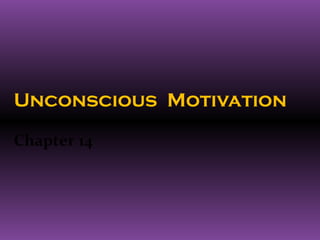
Ch14
- 2. Freud’s Dual-Instinct Theory EROS THANATOS Instinct for Life Instincts for Death e.g., instincts for e.g., instincts for • sex, • aggression toward self, (self-criticism, • nurturance, depression) • affiliation • aggression toward others (anger, prejudice)
- 3. ontempor ary Psychodynamic Perspectiv
- 4. hree Contempor ary Views on the Unconsciou Freudian Adaptive Implicit Unconscious Unconscious Motivation Automatically e.g., sets goals, Automatically appraises makes attend to the judgments, emotionally environment and initiates linked action environmental events
- 5. Psychodynamics The clashing of psychological forces Conscious volition (Will) Unconscious Counter-Will Idea Counter-idea Desire Repression Excitation Inhibition Cathexis (sexual desire) Anticathexis (guilt) Ego ID
- 6. Illustr ation of Psychodynamics
- 7. Do the ID and Ego Actually Exist?
- 8. Ego Psychology Ego Development (Loevinger, 1976)
- 9. Ego Development Symbiotic Infant, ego is immature and overwhelmed by impulses Welfare depends of and is provided by caretaker Impulsive External forces (parental rules) curb a child’s impulses and desires Self-Protective Child begins to understand rules and consequences and develops self-control Rules and consequences are internalized and guide one’s self-protective defense capabilities
- 10. Ego Development Conformist Ego internalizes group accepted rules Anxiety of group disapproval becomes a counterforce against impulses Conscientious Set of internal standards to curb and counter impulses Autonomous Thoughts, plans, goals, and behaviors originate from within the ego Self regulating and self motivating ego
- 11. Motivational Importance of Ego Development
- 12. Ego Defense Changes in Internal Or External Reality • Environmental Dangers (conflict with Anxiety, environment) Distress, Depression • Instinctual Presses (from Id) (conflict with impulses) Defense Mechanisms to • Superego Demands Buffer and Reduce Anxiety (conflict with conscience) Figure 14.1 Role of Defense Mechanisms in Buffering the Ego from Anxiety-Generating Events
- 13. Ego Defense Mechanisms Page 408 Denial Fantasy Projection Displacement Identification Regression Reaction formation Rationalization Anticipation Humor Sublimation
- 14. Ego Effectance White’s Model of Effectance Motivation Effectance Motivation When Successful, Sense of Competence Increases Willingness to Exercise Inevitable Voluntary Attempts Emerging and Existing Effects on or To Produce Intentional, Skills and Capabilities Changes in the Goal-Directed Environment Changes in the Environment
- 15. Freud’s Drive Theory Source of Drive Impetus of Drive Object of Drive Aim of Drive Bodily deficit Intensity of the Environmental Satisfaction psychological object capable by removing the discomfort of satisfying bodily deficit (anxiety) bodily deficit Development of mental representations of self through your relationships with others.
- 16. Object Relation Theory The quality of any one’s mental representation of relationships can be characterized by three chief dimensions:
- 17. Criticisms of the Psychodynamic Approach
